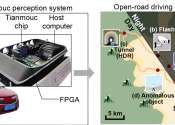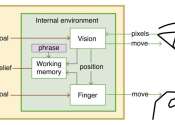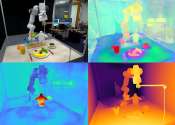What makes a chess move brilliant? Researchers use AI to find out
Researchers at the University of Toronto have designed a new AI model that understands how humans perceive creativity in chess.
Aug 7, 2024
0
54
Machine learning & AI

Researchers at the University of Toronto have designed a new AI model that understands how humans perceive creativity in chess.
Aug 7, 2024
0
54
Hardware

With the rapid advancement of artificial intelligence, unmanned systems such as autonomous driving and embodied intelligence are continuously being promoted and applied in real-world scenarios, leading to a new wave of technological ...
Jun 5, 2024
0
52
Machine learning & AI

An entirely new predictive typing model can simulate different kinds of users, helping reveal ways to optimize how we use our phones. Developed by researchers at Aalto University, the new model captures the difference between ...
Apr 18, 2024
0
24
Computer Sciences

Researchers have developed a new deep learning model that promises to significantly improve audio quality in real-world scenarios by taking advantage of a previously underutilized tool: Human perception.
Feb 7, 2024
0
61
Electronics & Semiconductors

Conventional silicon architecture has taken computer vision a long way, but Purdue University researchers are developing an alternative path—taking a cue from nature—that they say is the foundation of an artificial retina. ...
Nov 29, 2023
0
49
Robotics

Imagine you're visiting a friend abroad, and you look inside their fridge to see what would make for a great breakfast. Many of the items initially appear foreign to you, with each one encased in unfamiliar packaging and ...
Nov 2, 2023
0
165
Robotics

Researchers from the University of Science and Technology of China (USTC) of the Chinese Academy of Sciences (CAS) have proposed a soft-packaged and portable rehabilitation glove with fine movement training. It is expected ...
Oct 17, 2023
0
41
Consumer & Gadgets

Someone's prior beliefs about an artificial intelligence agent, like a chatbot, have a significant effect on their interactions with that agent and their perception of its trustworthiness, empathy, and effectiveness, according ...
Oct 2, 2023
0
27
Hardware

Researchers from the College of Electronic Information and Optical Engineering at Nankai University have used flexible artificial synapse devices to develop a neuromorphic motion perception system that realizes the brain's ...
Apr 26, 2023
0
344
Energy & Green Tech

Public attitudes towards some new low-carbon technologies could be negatively influenced by the fracking debate, new research from Cardiff University suggests.
Feb 6, 2023
0
32
In philosophy, psychology, and the cognitive sciences, perception is the process of attaining awareness or understanding of sensory information. It is a task far more complex than was imagined in the 1950s and 1960s, when it was predicted that building perceiving machines would take about a decade, a goal which is still very far from fruition. The word comes from the Latin words perceptio, percipio, and means "receiving, collecting, action of taking possession, apprehension with the mind or senses."
Perception is one of the oldest fields in psychology. The oldest quantitative law in psychology is the Weber-Fechner law, which quantifies the relationship between the intensity of physical stimuli and their perceptual effects. The study of perception gave rise to the Gestalt school of psychology, with its emphasis on holistic approach.
What one perceives is a result of interplays between past experiences, including one’s culture, and the interpretation of the perceived. If the percept does not have support in any of these perceptual bases it is unlikely to rise above perceptual threshold.
This text uses material from Wikipedia, licensed under CC BY-SA